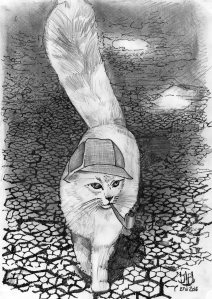Notes on source material for Rear Garden, or The Cat Who Knew Too Much (published March 2018)
Rear Garden took almost five years to write. The first few thousand words were written in the spring of 2013. I hit several garden walls and hedges. Life and other work got in the way. It was always at the back of my mind though and during these five years I watched many Hitchcock films and went back to the original novels or short stories that the films were based on, some more loosely that others.
Rear Window was based on a short story by Cornell Woolrich; Vertigo, a short novel by Boileau & Narcejac; The Birds, a short story by Daphne du Maurier, and Psycho from the novel by Robert Bloch. References to these works are scattered throughout Rear Garden, breadcrumbs cast onto a lawn.
I also reread American Psycho by Bret Easton Ellis. It was June 2017 and I was in New York City, visiting a friend. With several hours on buses ahead of us, I picked up Ellis’s book thinking it would at least pass the time on the bus. It was a time that I wished I had a wrapper over the book’s cover, so that people didn’t know what I was reading.
American Psycho only once directly references Hitchcock’s Psycho. Patrick Bateman, the antihero of Ellis’s book, tells a colleague: ‘… Janet Leigh was from Phoenix… She got stabbed in the shower. Disappointing scene… Blood looked fake.’
Perhaps Bateman’s dismissal of the film echoes Ellis’s own opinion. Bateman does love Brian de Palma’s 1980s’ film Body Double though. American Psycho mentions the film several times.
One brilliant example:
‘After more stretching exercises to cool down I take a quick hot shower and then head to the video store where I return two tapes I rented on Monday, She-Male Reformatory and Body Double, but I rerent Body Double because I want to watch it again tonight even though I know I won’t have time to masturbate over the scene where the woman is getting drilled to death by a power drill since I have a date with Courtney at seven-thirty at Café Luxembourg. ‘
Later in the book, Patrick returns to the video store:
‘Then, almost by rote, as if I’ve been programmed, I reach for Body Double – a movie I have rented thirty-seven times – and walk up to the counter where I wait for twenty minutes to be checked out by a dumpy girl (five pounds overweight, dry frizzy hair).
Patrick thinks, ‘the things I could do to this girl’s body with a hammer, the words I could carve into her with an ice pick.’
Patrick says to the check-out girl, ‘I like the part in Body Double where the woman… gets drilled by the… power driller… the best.’
I bought the DVD of Body Double when I got back to York, England. Brian de Palma described the film as ‘hardcore pornographic suspense’. It deals with themes including voyeurism and obsession. It is also a homage to the films of Hitchcock, particularly Vertigo, Rear Window and Psycho (the holy trinity of Hitchcock films).
The film was pummelled by critics on its release. Three weeks after its release, Columbia Pictures tore up Brian’s contract, painted over his car parking space and escorted him out of the building. As far as Columbia Pictures saw it, the film was a $10,000,000 fiasco.
Brian jumped into his car. He said to himself, ‘Holy mackerel!’ which is a favourite expression of his.
He then went on to make such great films as Carlito’s Way, The Untouchables, and Mission Impossible.
Body Double is admittedly not Brian’s greatest moment. The driller-killer scene echoes Hitchcock’s shower scene. But with Brian, we see a whole lot more. We see Melanie Griffith lying on the floor of her apartment. The bad guy is standing over her, the massive drill whining and whirring between his legs, before penetrating Griffith’s chest.
Holy mackerel!
